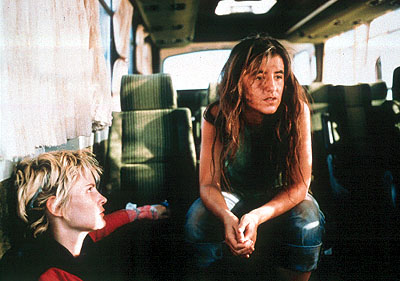

Before Survivor there was The King is Alive. The King is Alive is the fourth official Dogma film (after Celebration, The Idiots, and Mifune) and is only now getting a run in US theaters. Dogma movies adhere to a strict 'manifesto' of cinematic integrity, including no optical filters, no camera tricks, digital cameras only, no director credit (Kristian Levring directed here), and various other rules designed to get to the nitty-gritty of filmmaking. The intention is to let the story again become the essence of the movie. In The King is Alive, eleven strangers are lost in a remote section of the African desert. The nearest village is at least a five-day trek away, a trek that only one member is capable of making.
When he leaves, the rest must deal with the elements and themselves. They are stuck in an abandoned German mining town, and must survive in dilapidated, sand-filled houses with nothing except potentially dangerous, old canned carrots and water collected from dew. Each additional day lowers their resolve and increases their tension. Henry (David Bradley, Blow Dry, Pas de Trois) enlists everyone to stage a production of Shakespeare's King Lear. He wisely recognizes that they need something to take their mind off their troubles, and also sees the parallels between Lear and their own situation. Trapped with nothing to do, the group dynamic quickly crumbles, and this production seems to be the only thing holding their sanity.
Levring, who wrote the movie along with Anders Thomas Jensen use the Dogma rules to their advantage. The digital camera shots do not provide the crisp, clean images that movies usually have, and the shaky cameras lend a sense of immediacy. The characters' discomfort from their plight and unsanitary conditions is evident. Gina (Jennifer Jason Leigh, eXistenZ, The Love Letter) makes a Faustian deal with somebody to ensure his participation. The relationships between Liz (Janet McTeer, Waking the Dead, Tumbleweeds) and her husband, and amongst other couples, become sorely tested. The appearances of these people becomes noticeably more haggard as The King is Alive progresses. Their actions become increasingly labored, and pressures mount.
One reason The King and I is interesting is that all the actors are playing people who are not actors that are trying to act. But there are just too many people, and Levring chooses to focus sometimes on petty arguments. Aside from Henry, Catherine (Romane Bohringer, Rembrandt, Vigo) is probably the most interesting person. She is smarter and more cynical, and refuses to participate in the play. This only means that she is away from the spotlight for most of the film. The most glaring inconsistency in the film revolves around Moses (Vusi Kunene, A Reasonable Man, The Storekeeper). Moses is a native who apparently lives in the abandoned town. He does nothing but sit around all day, and somehow he survived and there is no indication that he will not continue to do so for some time. Yet, he is in no danger. If these people would only do what he does, then they would be fine too.